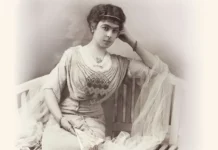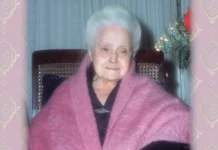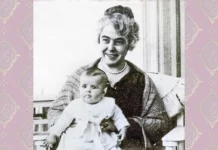In Dona Lucilia could be found the grandeur of Christian old age, sanctified by the merit of motherhood, and glorified by that discreet halo that sufferings borne in union with Christ bestows upon the soul and the features of all the just.
Certain wines, in order to give their best to those who will taste them, are stored in the solitude of deep cellars, out of the sunlight. There, over a period of years and decades, their flavour is refined, they acquire a rich bouquet, their harsh aftertaste mellows, and even their colour is enlivened.
Age, which perfects the flavour of good wine, also brings out the virtues of just souls. With Dona Lucilia, affability only became more refined with the passing of time. Her interior elevation was increasingly infused with the supernatural, her manners and her presence became, to an even greater degree, attractive factors of well-being and respectability.

in São Paulo’s FIESP Auditorium
Just as wine revitalizes a weakened body, Dona Lucilia – imbued with profound confidence in the infinite goodness of the Sacred Heart of Jesus – continued to give solace to all those who approached her needing consolation, expertly applying the balm of Christian charity.
If Dona Lucilia had given up her soul to God at this point, her earthly existence would already have been a beautiful one. Yet, over the last phase of her life, the plenitude of her affection and benevolence would achieve an even brighter lustre within the recollected setting of her residence.
If they had the gift of speech, the walls and the objects of this apartment would have so much to say. How we would like to hear what the statue of the Sacred Heart of Jesus could tell us about Dona Lucilia’s ceaseless prayers. No one ever knew what she said to Our Lord during those silent dialogues – on this point, she did not even confide to her son.
Yet while this hallowed intimacy would remain an inviolable secret, some small episodes of Dona Lucilia’s serene home life have made their way beyond the walls of that blessed home.
Maternal care
From a tender age, Dr. Plinio had been gifted with a lucid and uncommon discernment of spirits – a gift of the Holy Spirit which, from the first glimmer of his reason, he put to use regarding his own mother. In this way, he had a deep understanding of the elevated qualities with which Providence had adorned her soul. Later, concrete facts confirmed the authenticity of what he had discerned.
As he left home one day for his law office, his mother accompanied him, as usual, to the elevator door. After they parted, she went to the living room, already deliberating over the nice dinner that she was going to prepare him. To help her plan the menu, there was no other sounding board at hand than her husband.
She had no idea that her son would have the opportunity to witness, with true enchantment, the quaint scene that then transpired. Had he not seen it, he would never have been able to imagine it. Returning to pick up a paper he had left behind, he slipped into the apartment silently so as not to disturb his parents. Passing close to the living room, he heard Dona Lucilia’s voice through the half-open door:
“João Paulo, I was thinking about making such-and-such a dish for Plinio. Do you think that would be good?”
“Yes, very good…”
“But do you think Plinio would really enjoy that and not something else?”
Seated comfortably in an armchair, Dr. João Paulo replied:
“Yes, certainly he would enjoy it!”
Not entirely convinced, Dona Lucilia pressed a little further with her natural amiability:
“I don’t know, João Paulo, if that’s really the best dish. Might he not prefer such-and-such?”
Somewhat baffled, not seeing the reason for such concern, he answered:
“Well, I guess a father is no mother. If it was up to me, I’d tell him: ‘Young man, what’s for dinner is this and that. If you don’t like it, go to a restaurant.’”
Now if there was one thing that Dona Lucilia did not want, it was to give up her son’s company at dinner. Therefore, she limited herself to calmly expressing her disagreement with that reply:
“No, no!…”
Delighted with this fresh proof of maternal solicitude, Dr. Plinio slipped away without being noticed. On the street, he mused to himself: “A father, as good as he may be, is not capable of taking this kind of care. Such questions could only occur to the heart of a devoted mother – with its delicacy, subtlety, and desire to please. That’s why the menu at home is so tasty…”
Much appreciated for her culinary skill
The constant “love one another” oriented even the simplest actions of this incomparable mother, and this included her culinary art.
In planning a menu, she strove to “season” the food much more with affection and goodness than simply with ordinary ingredients. Needless to say, Dr. Plinio was especially fond of this “recipe,” for though he was always a good gastronome, he was an even better son.
Those close to Dona Lucilia were able to not only experience her benevolence, but also to appreciate the cuisine prepared according to her instructions. For example, Dona Zili’s husband, Nestor, warmly remembered the Sunday dinners put on by his sister-in-law, years after she had passed away.
He would say that he didn’t know anyone as capable of organizing the preparation of such delicious dishes as Dona Lucilia, especially her appetizing homemade desserts. Particularly noteworthy among these were Dr. Plinio’s birthday cakes, the only project that she would carry out entirely by herself, with considerable flair.
In fact, even as Dona Lucilia reached an advanced age and relied on a wheelchair to move about, she still insisted on preparing this cake – a superlative chocolate pavé, artistically decorated – for her son’s birthday. Sparing no effort, she would first sketch out her plan in all its particulars, choosing the shape, the colours, and the final touches; and then she would follow her design to the letter.

“This lady is very Spanish!”
Notwithstanding her great tenderness, Dona Lucilia, was uncompromising in the defence of Catholic principles. If these came under attack by anyone at all, she would draw herself up, seeming to increase her height, and, without losing her gentility, and always in a calm tone, she would immediately voice her opposition:
“No! That is not so…” And she would proceed to set things straight.
Dr. João Paulo, like a genuine native of Pernambuco, had a decidedly placid temperament. Dr. Plinio declared him to be the most pacific man he ever met. His many years of married life with Dona Lucilia were spent in the most perfect harmony. Whenever he saw her assuming a more emphatic stance, he would murmur to his son, referring good-humouredly to certain bloodlines she carried from her remote ancestry:
“Uh-oh!… This Spanish lady!…”
The crystal vase
Evidently, whenever Dr. João Paulo was experiencing difficulties, Dona Lucilia would turn her unequalled kindness toward him in a special way, with all the compassion of someone who knows how to penetrate to the deepest part of a person’s suffering, to apply to it a drop of soothing balm.
One afternoon, when he returned home from work, Dr. Plinio found his father alone in the living room. He greeted him in the customary way:
“Good afternoon, Papa, how are you?”
“Fine, thank you,” responded Dr. João Paulo morosely. Without guessing the reason for his mood, his son headed to Dona Lucilia’s room, where he found her praying.
When she saw him enter, she made a sign with her finger for him to speak quietly, and to sit down next to her. Then, in a voice filled with compassion she said:
“Filhão… Did you see how crestfallen your poor father is? He accidentally knocked over your magnificent Bohemian crystal vase, which fell to the floor and shattered.”
“My dear, Papa broke the crystal vase?” Dr. Plinio exclaimed, taken by surprise and unable to hide his disappointment, since it was an object he valued highly.
“Yes, but he is suffering keenly… A word from you would be all it would take to make him feel better. Would you do that for your mother?”
Dr. Plinio would have forgiven his father with entire good will in any case – after all, the loss of a mere crystal vase, as fine as it may be, was no grounds for such distress. In reply to Dona Lucilia’s affectionate request, he went straight to Dr. João Paulo to put him at ease. With a smile, he told him not to worry, he knew it was an accident, and to him it was of no importance. His words immediately reassured his dejected father and restored his habitual good humour.
Similar manifestations of Dona Lucilia’s affection reached far beyond the confines of her own home. If her compassion was so readily extended even toward strangers, it was all the more so within family circles, whether close or distant.
An unexpected visit
One day, Dona Lucilia was sitting down to a meal, when a distant relative, to whom life had dealt many heavy blows, rang the bell of the apartment.
The maid, having answered the door, came to announce that Dona So-and-so was at the door, and wished to speak to Dona Lucilia. The latter, knowing about the hardships that this person had experienced, interrupted her lunch and hurried to the foyer to receive her with great affability.
“Oh, So-and so! How are you? Please come in…”
She invited her into the dining room, offered her a seat at table and put her entirely at ease. Dona Lucilia inspired such confidence, that the visitor soon ventured to tell her about her troubles and sorrows. She received, as she had hoped, every consolation and encouragement to forge ahead on life’s rough roads, trusting in Divine Providence.
Once again, a counsel coming from the lips of someone who followed the law of the Divine Master’s mercy had been a powerful aid to those who had been struck down by life’s blows. This way of acting, that complemented Dona Lucilia’s other virtues, was yet another point of resistance against the moral decline of her times. Indeed, the myth of success had led many of her contemporaries to flee with disdain from anyone hit by misfortune, as if it were leprosy that was spread by contact…

in a room of Dona Lucilia’s residence
“If you were to lose the Faith, it would be to me as if you had died”
From everything that has been narrated so far, it is easy to deduce that Dona Lucilia’s ocean of tenderness toward her very Catholic son was firmly rooted in the Faith. The question could arise: Was this maternal affection not predominantly based on human sentiments?
It was Dr. Plinio who obtained the reply. On one occasion, he wished to measure the extent to which the love of God in Dona Lucilia outweighed her natural love of a mother for her son. When two of them were at table alone, he led the theme of the conversation “by chance” to the point that he wished to cover. He then affirmed:
“Mother dear, it is because you are a Catholic that I have such affection for you. If, for example, during this meal, you were to tell me that you had become a protestant, I would immediately interrupt you, saying: ‘You are the lady of this house. Here are the house keys; I’m going to live elsewhere. I will not fail to provide you with what you need to live with dignity, but we will only get together two or three times a year, at most!’
“I would do this with the greatest displeasure of my soul, because the true bond of our affection would have been broken. To me, it would feel like you were no longer a mother. It would be as if you had died. If you became a protestant, you would cease to be what you are to me.”
It could be supposed that Dona Lucilia’s maternal sensibility would have been hurt by these words. She had made so many sacrifices for her children throughout her life, and had loved them so tenderly that Dr. Plinio’s categorical attitude may have been taken as a mark of ingratitude. But, much to the contrary, she listened to these words so naturally that, without the least sign of astonishment, she continued calmly with her meal. It did not seem to her that her son had said anything extraordinary, for she thought and felt the same way.
It was for seeing such a sublime and selfless love for the Catholic Church in his mother that, moments after her death, in the room where she had died, Dr. Plinio made this impressive affirmation:
“I admired her much more for being the way she was, and for the virtue I discerned in her, than for being my mother. In fact, if she had been someone else’s mother and not mine, I would have done everything possible to be able to live close to her.”
The white-haired lady
“I beheld the authentic figure of a great Christian lady. Time had left its indelible mark upon her whole being; a mark of deep sorrows, borne with great nobility, with great gentleness of soul. Her eyes were calm, beautiful and mournful. They were penetrating yet sweet, intelligent yet serene.
“Her bearing, her gestures, her clothing were of that simple, noble and unconcerned elegance that true good manners lends to human vesture. The tone of her voice – affable, reserved and nuanced, revealed a heart both strong and delicate.
“At certain moments, the light streaming through the window illuminated her white hair. A silvery reflection, mixing itself with the gentleness of her gaze, spread over her countenance. All light brings happiness to mind. The light of that white hair brought to mind a happiness that is not of this world. It was the grandeur of Christian old age, sanctified by the merit of motherhood, glorified by that discreet halo that sufferings borne in union with Christ bestows upon the soul and the features of all the just. Great dignity – even a certain majesty, we would say. Not the arduous, hard-earned and dubious majesty of wealth, but the unique and supreme majesty that flows from the dignity of motherhood, felt and lived to the deepest fibres of a heart born of noble lineage.” ◊
Taken, with slight adaptations, from:
Dona Lucilia. Città del Vaticano-
Nobleton: LEV; Heralds of the Gospel,
2013, p.525-533.






